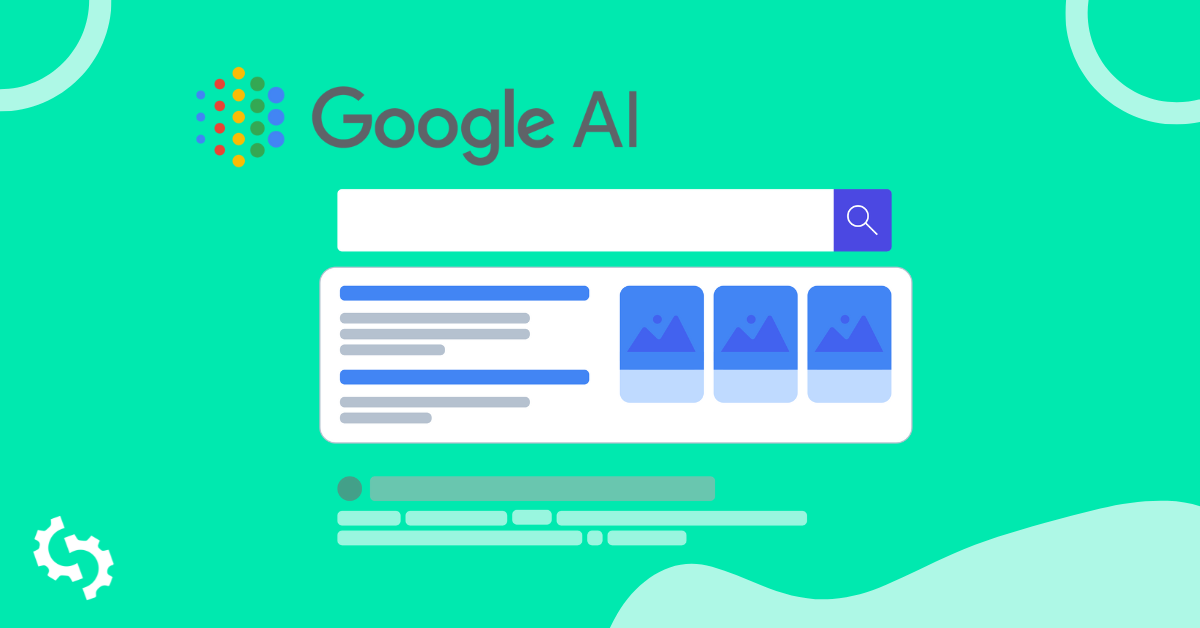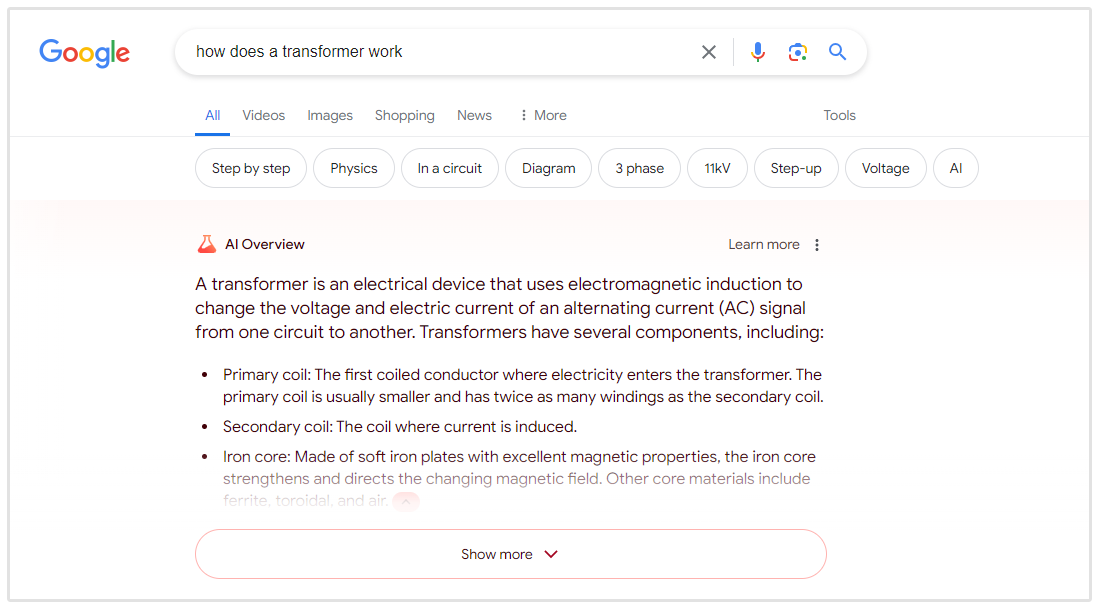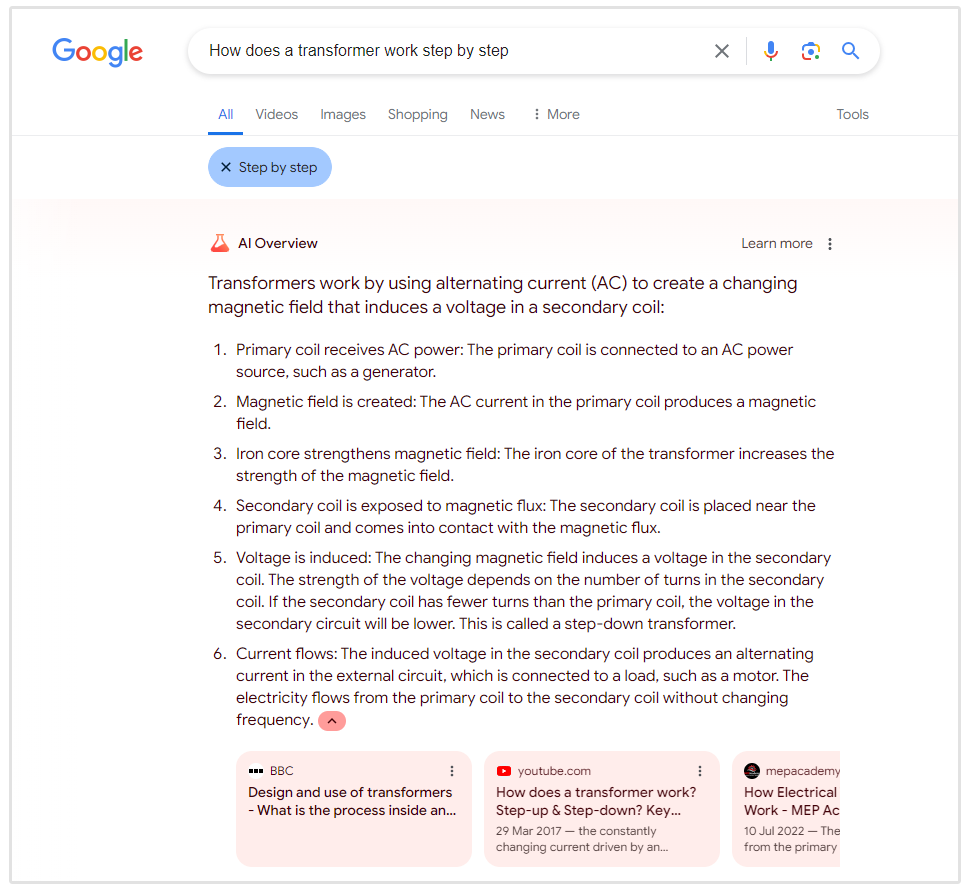
Google AI Overviews is one of the latest announcements and product updates from the search engine giant this year.
Google held its annual I/O conference recently and claims to have announced 100 new features and product announcements.
This spans across many of their key products such as Gemini, Search, Workspace (including Gmail, Docs, Drive, etc.) computer chips, image generation models, Photos, and the list goes on.

You can read more about all of these in their "100 things we announced at I/O 2024" blog post.
In this article, we will focus more on the changes coming to Search.
More specifically, we're going to take a closer look at Google AI Overviews and what this means for SEOs and business owners. At the end of the post, we'll also share some insights and tips from marketers on how they are optimizing their websites for Google AI Overviews.
We'd like to thank the following marketers and agency founders for their valuable contributions and insights:
- James Ewen, Founder @ SEOtagg, London, United Kingdom
- MaLynn Pierce, Team Leader and SEO Speciliast @ Haro Helpers, Cardiff, United Kingdom
- Parker Warren, CEO @ PWA Media, Salt Lake City, United States
- Bogdan Krstic, Founder @ Krstic SEO, Belgrade, Serbia
- Ahmed Elmahdy, Founder @ Rocket Launch Media, Jakarta, Indonesia
What are Google AI Overviews?
Google AI Overviews are an improvement on what used to be called Search Generative Experience (SGE). AI Overviews present information in a more user-friendly way, with AI-generated summaries appearing at the top of search results.
For instance, if you search for the key phrase "how does a transformer work", then you'll get an AI-generated answer explaining the intricacies of transformers.

Google also generates a list of sub-topics that you can choose from at the top of the AI Overview. For instance, if I click on "Step by step", Google will explain the entire process for me.

These summaries provide a quick grasp of the topic, making complex subjects easier to understand.
With Google AI Overviews, users can now delve into complex topics without leaving the initial search page. This builds upon the Search Generative Experience (SGE) Google introduced earlier, further highlighting the potential of AI in search.
In fact, SGE was just an experiment, but has now morphed into a feature that all search engine users will have access to. Google announced that AI Overviews will be rolled out to all users in the US, with more countries expected soon.
This new feature has significant implications for how we search the web, how we create content, and how we approach digital marketing.
So then, what are these big changes and how is AI Overviews different from the SGE experiment?
What's Changing with Google AI Overviews?
Summarize or Dive Deep on Topics
AI Overviews will soon offer users the ability to fine-tune the way in which information is presented. This means you can choose to simplify the language for easier understanding, or delve deeper with additional details.
Imagine you're just starting to explore a new subject, or trying to explain something complex to your child.
AI Overviews will adapt to your needs, making information accessible to everyone. This feature hasn't been rolled out yet, but Google says its coming soon to Search Labs, for English queries in the US.
One Search for All Your Questions
AI Overviews features Gemini's new multi-reasoning capabilities which means you'll be able to ask even more complex questions in one shot without having to perform multiple searches.
Imagine you're planning a weekend getaway with your partner who loves hiking and you're more of a museum enthusiast. Traditionally, you might do two separate searches for "best hiking trails near Seattle" and "museums near Seattle".
With AI Overviews' multi-step reasoning, you can ask a single, comprehensive question like, "Find a weekend getaway destination within a 4-hour drive from Seattle, with great hiking trails and interesting museums for different interests."
Instead of a list of links, AI Overviews would use its understanding of your question and location to provide a more helpful response. This might include:
- A shortlist of charming towns or national parks within driving distance.
- Information on nearby hiking trails with difficulty levels and scenic highlights.
- Recommendations for museums catering to different interests, perhaps including virtual tours or special exhibits.
- Links to resources for planning your trip, like estimated travel time and accommodation options.
Again, Google hasn't been clear on when this feature will officially launch.
Take Visual Search to a New Level
Often, our questions involve things we see in the real world, like objects in motion.
AI Overviews will soon support visual search. This means you can ask questions directly related to a video or picture that you have. You'll also be able to turn on your camera and use Search to find more information on whatever you see.
Ever stumble upon an interesting plant while hiking or gardening, but have no idea what it is? Describing its features through text can be tricky. With AI Overviews' video search, simply record a short clip of the plant.
This could include close-ups of its leaves, flowers (if present), and overall growth pattern. AI Overviews, using its advanced video understanding capabilities, will analyze the footage and provide an overview with:
- The most likely plant species based on its visual characteristics.
- Links to detailed information about that plant, including its care requirements and potential toxicity (especially helpful for pet owners!).
- Suggestions for gardening forums or plant identification apps for further exploration.
Your Own Personal AI Powered Search Assistant
With AI Overviews, Search can be used as your own personal planning assistant. Soon, Search will offer built-in planning tools to help you tackle anything from meals to vacations.
Birthdays can be exciting, but also overwhelming to plan. With Search's planning capabilities, simply search for something like "plan a fun birthday party for a 7-year-old at home."
AI Overviews will then analyze your request and provide you with a customized party plan breakdown. This might include:
- Theme suggestions: From pirates to superheroes, Search will suggest age-appropriate themes based on your child's interests.
- Activity ideas: It can even propose party games, craft projects, or even science experiments that are engaging and educational.
- Recipe recommendations: Whether you need ideas for a birthday cake or fun party snacks, Search will offer a variety of options based on dietary restrictions or preferences.
- Decoration inspiration: Feeling stuck on decorating? Search can provide links to DIY decorations or party supply stores.
How Marketers Need to Adapt for AI Overviews
The recent launch of Google's AI Overviews marks a significant change in how people interact with and use search engines. We've seen hints of this shift with the SGE experiments, but now the impact is real and immediate.
So, how can you adapt and rank in these AI Overviews? Generative Engine Optimization (GEO) might be the key.
GEO represents a major shift in SEO practices, aligning them with the capabilities of AI search engines like Google's AI Overviews and Microsoft's Bing Chat. GEO tailors traditional SEO strategies for the AI era by optimizing content for these generative engines.
This new approach is vital for content creators who want to succeed in a search landscape increasingly dominated by AI. Understanding and implementing GEO strategies can significantly improve content visibility within these new environments.
Some of the key concepts of GEO are:
- Improving a website's E-E-A-T scores
- Optimizing for Google's Knowledge Graph
- Using NLP principles to create content that is easy to read and understand
- Adding quotes and statistics to blog posts
- Associating your business with popular brands online
Remember, AI search engines don't just fetch information, they create rich, integrated responses that can satisfy user queries directly. This could potentially bypass the need to click through to websites altogether.
We anticipate up to a 30% decrease in organic traffic for some of our client's sites, especially where AI-generated overviews are prominent, as they tend to push down regular search results.
- James Ewen, Founder at SEOtagg
A useful tip to optimize for Google AI Overviews specifically is to answer the user's query within the first sentence of a blog post. Almost like a short little snippet directly addressing the question or problem the searcher has. And then a long, in-depth explantion of the topic of the post.
We’ve found that catchy content and short blurbs, followed by more in-depth information, have worked well for our blog posts. Our first sentences of each section are short and sweet, and they answered questions that people are looking for on search engines.
- MaLynn Pierce, Team Leader and SEO Specialist at Haro Helpers
Parker Warren, the CEO of PWA Media, an SEO agency based in Salt Lake City, suggests that webmasters should incorporate FAQ schema on their websites to gain an edge in AI Overviews.
The use of FAQ schema and how-to schema helps the search engine understand the context/relevance of your content better so that it can place your site in rich results or create its summaries when an AI-based search engine responds to a query.
- Parker Warren, CEO at PWA media
Bogdan Krstic is another digital agency founder who believes that schema markup and structured content is more important now than ever before.
Structured content is king. I'm talking about clear headings and short paragraphs beneath. I think this makes it way easier for AI to parse and understand your content. Along those lines, FAQ sections are absolute gold. There's a reason why AI answers have them all the time, and we try to mimic the question-and-answer format that AI uses as much as possible.
- Bogdan Krstic, Founder at Krstic SEO
As I mentioned earlier, one of the key features of Google AI Overviews is the conversational experience that it provides users. According to one of the digital agency founders we polled, marketers should try to use a natural, converstional writing style in order to optimzie for this search experience.
AI understands natural language better than traditional SEO techniques. We write content as people speak, using conversational phrases and the words they use when searching by voice.
- Ahmed Elmahdy, Founder at Rocket Launch Media
Wrapping Up
AI Overviews pave the road for a new era in Google Search. For users, the integration of AI into Search will likely result in a better user experience, giving them faster and more comprehensive information.
The core concept of AI Overviews is that Google will piece together all of the most relevant information about the main topic as well as any relevant sub-topics.
As for marketers, we're left with figuring out how to navigate this new era of AI and Search.
In my opinion, there is bound to be some disruption, but this also creates new opportunities for the curious-minded marketers to adapt their strategies to gain benefit from AI Overviews.



.jpg)










